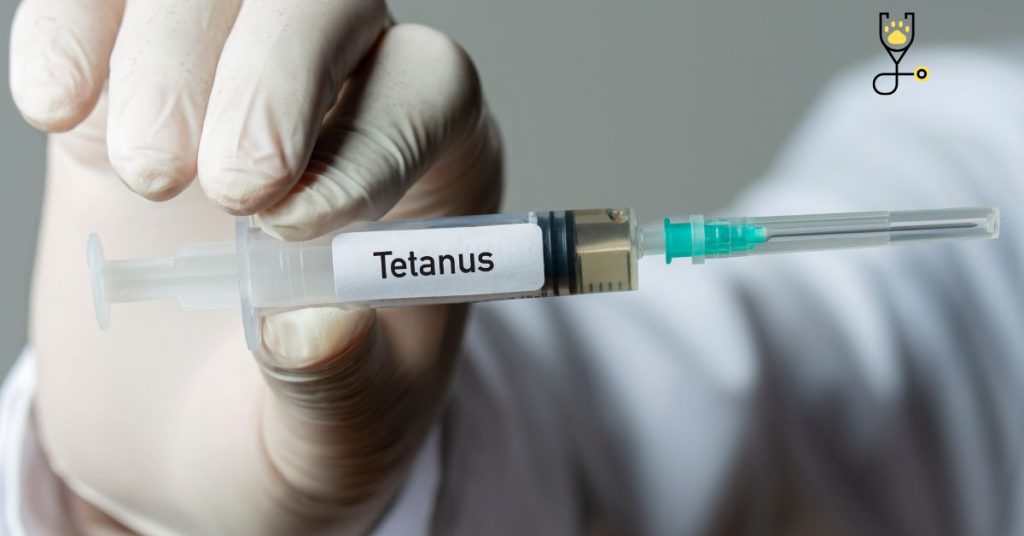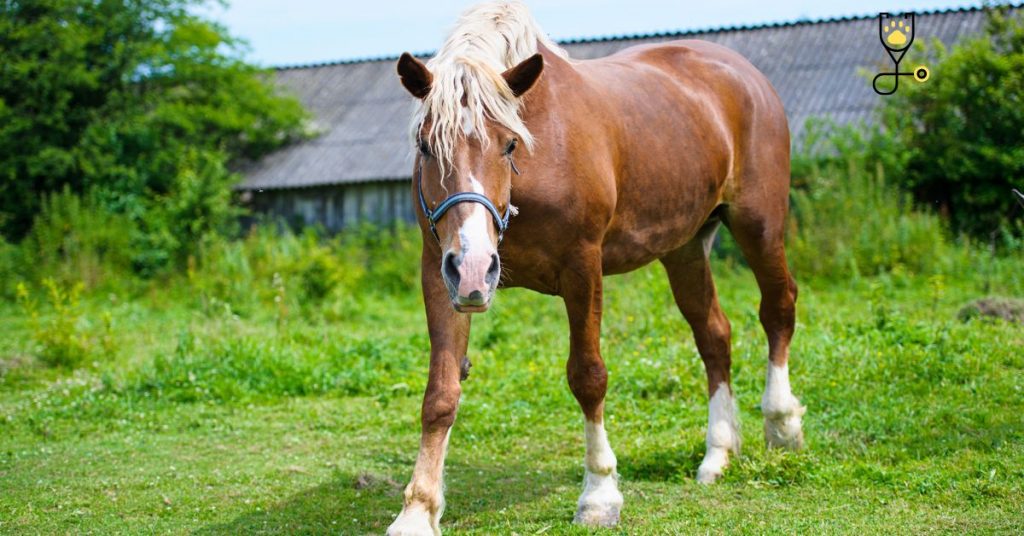Do you know what tetanus is? Tetanus is a serious disease that can affect both horses and dogs. It’s caused by a toxin produced by the Clostridium tetani bacteria, and it can lead to muscle spasms, neck stiffness, and even death. In this post, we’ll discuss the symptoms of tetanus in horses, the causes of this deadly disease, and the treatment options available. We hope this information will help keep your horse safe and healthy!
What Is Tetanus In Horses?
Tetanus is a serious disease that can affect both horses and dogs. It’s caused by a toxin produced by the Clostridium tetani bacteria, and it can lead to muscle spasms, neck stiffness, and even death. Tetanus is most commonly contracted through deep wounds or punctures (such as those from nails or knives), but it can also enter the body through mucous membranes (such as the nose or mouth) or broken skin. The bacteria typically live in soil, feces, and dust, so any time your horse comes into contact with these substances, there’s a risk of infection.
Symptoms Of Tetanus In Horses
The symptoms of tetanus in horses can vary depending on the stage of the disease.
1. Stiffness: In the early stages of tetanus, you may notice your horse is stiff or reluctant to move. This stiffness can progress to muscle spasms and convulsions as the disease progresses.
2. Sweating: Another early symptom of tetanus is sweating. Your horse may break out in a sweat even when it’s not hot or exercising.
3. Heart rate: As the disease progresses, you may notice your horse’s heart rate increasing.
4. Difficulty swallowing: One of the late-stage symptoms of tetanus is difficulty swallowing. This can lead to drooling and an inability to eat or drink.
5. Fever: Fever is another late-stage symptom of tetanus.

If you notice any of these symptoms in your horse, it’s important to seek veterinary care immediately. Tetanus is a serious disease that can be deadly, so early diagnosis and treatment are essential.
Causes Of Tetanus In Horses
1. Clostridium tetani bacteria: The Clostridium tetani bacteria are the primary cause of tetanus in horses. These bacteria typically live in soil, feces, and dust.
2. Punctures or wounds: Tetanus is most commonly contracted through deep punctures or wounds (such as those from nails or knives). It can also enter the body through mucous membranes (such as the nose or mouth) or broken skin.
3. Infected meteor feces), there’s a risk of infection.
4. Tetanus spores: The Clostridium tetani bacteria produce spores that can survive in the environment for years. These spores can infect horses if they come into contact with them.
5. Vaccination: One of the most important causes of tetanus in horses is a lack of vaccination. Tetanus is a preventable disease, but horses who are not vaccinated are at risk of contracting it.

Treatment Of Tetanus In Horses
If you suspect your horse has tetanus, it’s important to seek veterinary care immediately. There is no specific cure for tetanus, but early diagnosis and treatment can improve the chances of survival. Treatment typically involves supportive care and aggressive management of the symptoms. This may include:
1. Intravenous fluids: Intravenous fluids are often used to help stabilize the horse and prevent dehydration.
2. Antibiotics: Antibiotics are used to kill the bacteria that cause tetanus.
3. Muscle relaxants: Muscle relaxants may be used to control muscle spasms and convulsions.
4. Pain relief: Pain relief may be necessary to control the pain associated with muscle spasms and convulsions.
5. Surgery: In some cases, surgery may be necessary to clean the wound and remove any dead tissue.
6. Nursing care: Nursing care is often necessary to ensure the horse receives the proper nutrition and supportive care.

Tetanus is a serious disease that can be deadly, so it’s important to seek veterinary care immediately if you suspect your horse has been infected. With early diagnosis and treatment, many horses can recover from this disease.
Preventions Of Tetanus In Horses
The best way to prevent tetanus is to ensure your horse is up-to-date on its vaccinations. Tetanus vaccines are typically given every 6 months, but your veterinarian may recommend a different schedule based on your horse’s risk factors.
It’s also important to practice good hygiene and cleanliness around your horse. This includes washing your hands after handling horses, cleaning wounds promptly, and disinfecting equipment. If you suspect your horse has been exposed to tetanus, it’s important to seek veterinary care immediately.
How To Diagnose If A Horse Has Tetanus?
There is no specific test for tetanus, so diagnosis is typically based on the horse’s symptoms and history. If your horse has a deep puncture wound or has been exposed to contaminated materials, your veterinarian may suspect tetanus.
To confirm the diagnosis, your veterinarian may recommend:
1. Blood tests: Blood tests may be used to look for antibodies that indicate an infection with the Clostridium tetani bacteria.
2. Spinal tap: A spinal tap may be used to look for the presence of the Clostridium tetani bacteria in the horse’s cerebrospinal fluid.
3. X-rays: X-rays may be used to look for abnormalities in the horse’s bones or joints.
4. Muscle biopsy: A muscle biopsy may be used to confirm the diagnosis of tetanus. This involves taking a small sample of muscle tissue and testing it for the presence of the Clostridium tetani bacteria.
5. Imaging: Imaging tests (such as CT or MRI) may be used to look for abnormalities in the horse’s brain or nervous system.
Prognosis Of Tetanus In Horses
The prognosis for horses with tetanus is often poor, but early diagnosis and treatment can improve the chances of survival. Many horses that recover from tetanus require long-term nursing care.
Tetanus is a serious disease that can be deadly, so it’s important to seek veterinary care immediately if you suspect your horse has been infected. With early diagnosis and treatment, many horses can recover from this disease.
Conclusion
Tetanus is a serious disease that can be deadly, so it’s important to seek veterinary care immediately if you suspect your horse has been infected. With early diagnosis and treatment, many horses can recover from this disease.
Frequently Asked Questions
1. What is tetanus?
Tetanus is a serious disease caused by the bacteria Clostridium tetani. These bacteria typically live in soil, feces, and dust.
2. What are the symptoms of tetanus?
The symptoms of tetanus include muscle spasms, convulsions, and fever.
3. How is tetanus treated?
There is no specific cure for tetanus, but early diagnosis and treatment can improve the chances of survival. Treatment typically involves supportive care and aggressive management of the symptoms.
4. How can I prevent tetanus?
The best way to prevent tetanus is to ensure your horse is up-to-date on its vaccinations. Tetanus vaccines are typically given every 6 months, but your veterinarian may recommend a different schedule based on your horse’s risk factors.
5. What is the prognosis for horses with tetanus?
The prognosis for horses with tetanus is often poor, but early diagnosis and treatment can improve the chances of survival. Many horses that recover from tetanus require long-term nursing care.





